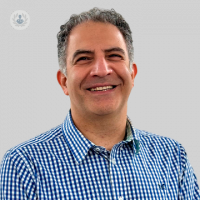The role of family history in your health: what you need to know
Escrito por:Family history plays a significant role in determining your health risks. Understanding how your relatives' health can influence your own well-being is crucial for managing potential future health issues. Below are some common questions patients often ask about family history and its impact on health.

health risks and prevent future complications
What does family history mean in terms of health?
When we talk about family history in healthcare, we are referring to the health conditions that have affected your close relatives, such as parents, siblings, and grandparents. These conditions may be passed down through generations due to shared genetic factors or lifestyle habits.
Knowing about your family history can help your doctor assess your risk of developing conditions like heart disease, cancer, and diabetes, which tend to run in families.
How does family history affect my health?
If your relatives have certain medical conditions, you might be at an increased risk of developing them too. For example:
- Heart disease: conditions like high blood pressure and cholesterol can be inherited, leading to an increased risk of heart disease or stroke.
- Cancer: cancers like breast, ovarian, and colon cancer have a genetic component, particularly if diagnosed at an early age in relatives.
- Diabetes: a family history of type 2 diabetes increases your likelihood of developing it, especially when combined with other risk factors like obesity and inactivity.
However, a family history does not guarantee you will develop these conditions; it simply increases your risk. Your doctor can help you understand your individual risk based on your family background.
What should I tell my doctor about my family history?
When discussing family history with your doctor, it's important to provide detailed information. This includes:
- The health conditions your relatives have or had.
- The age at which they were diagnosed.
- Any significant causes of death in your family.
The more detailed your family history, the better your doctor can assess your risk and recommend preventive measures. This can also guide decisions about screening tests, such as mammograms, colonoscopies, or genetic testing.
Can lifestyle changes reduce my risk, even with a family history?
Yes, even if you have a strong family history of certain conditions, adopting a healthy lifestyle can help lower your risk. Common recommendations include:
- Healthy eating: a balanced diet rich in fruits, vegetables, whole grains, and lean protein can help prevent heart disease, diabetes, and some cancers.
- Regular exercise: physical activity helps manage weight, improve cardiovascular health, and reduce your risk of many chronic conditions.
- Quitting smoking: if you have a family history of lung cancer or heart disease, quitting smoking significantly reduces your risk.
Lifestyle factors play an important role and can sometimes counteract the risk posed by family history.
Are there any genetic tests available?
In some cases, genetic testing may be recommended to assess your risk more accurately. For example:
- BRCA1 and BRCA2 testing for breast and ovarian cancer risk.
- Lynch syndrome testing for colorectal cancer.
These tests are usually advised when there is a strong family history of early-onset disease. Your doctor can help you determine whether genetic testing is appropriate for you.
How often should I review my family history with my doctor?
Family history should be reviewed periodically, especially if new information becomes available, such as a relative being diagnosed with a serious condition. Regular updates allow your doctor to adjust your health plan and ensure you are receiving the right screenings or treatments.
What should I do if I am concerned about privacy?
It's natural to have concerns about sharing sensitive family information. Rest assured, in the UK, patient confidentiality is strictly maintained, and your medical information is handled with care. Your family history will be used solely to improve your health outcomes.


